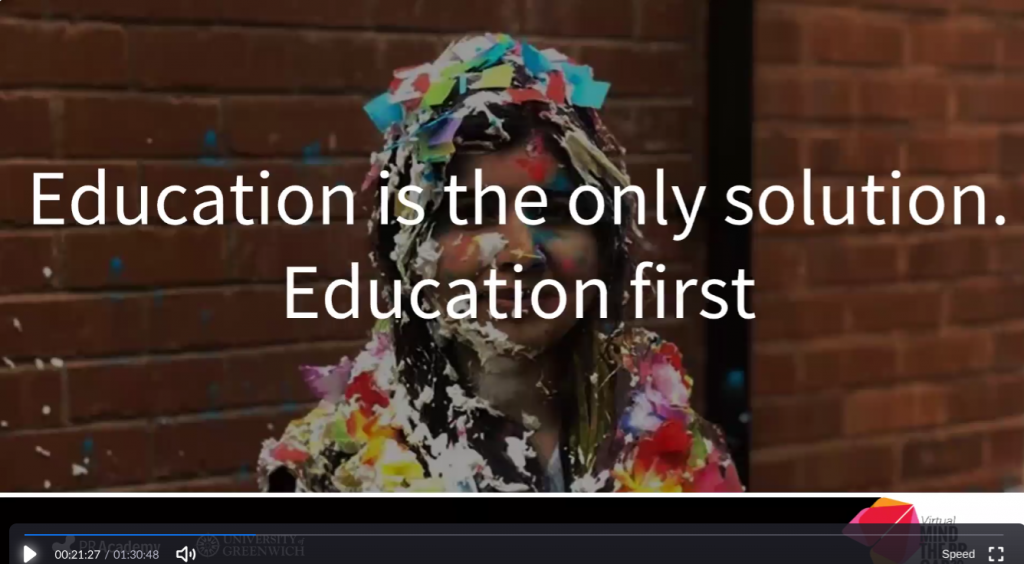#MindThePRGap2020 day two: ‘Education is the only solution’

About the author
Richard Bailey Hon FCIPR is editor of PR Academy's PR Place Insights. He teaches and assesses undergraduate, postgraduate and professional students.

Our focus on day two was the future of work and careers, and we called on practitioner, academic and professional body insights in our discussion.
Satyen Dayal is exceptional. He graduated with a public relations degree from Bournemouth University in 2001 and has since worked for a succession of big-name consultancies leading up to his current role at Edelman.
He addressed the question of future skills by a longitudinal look at the issues raised in the Edelman Trust Barometer and the question of whether technology can help resolve the existential threats we face.
‘We are at a moment our skills as negotiators who bring mutual advantage between audiences and organisations are never more needed.’
Finding an optimistic story from 2020 he reminded us that Malala Yousafzai has just graduated from Oxford University. ‘Amongst other things the blue-tick Nobel-prize-winning 22 year-old has practised what she preached: taking action to do what is ethically right.’
‘Broadly, I’d say that our skills as practitioners are undergoing a massive digital transformation, but how we apply these skills is far from clear. It’s certainly no more Zoom calls: perhaps part of the solution, but not all of it. And as we look to the future of change, uncertainty, exhilaration and terror, as Malala says, education is the only solution. Education first.’
For others, careers are not so much linear as fluid and unstructured. This year in particular is posing challenges, so it was timely to address the future of careers and skills in our sector.
Dr Sarah Bowman spoke with passion about change. ‘PR is very well placed to take advantage of these changes. We have to look ahead to the type of knowledge and skills necessary to take advantage.’
Drawing on concepts from sociologist Signmund Bauman, she discussed a world of uncertainty, ambiguity and complexity. ‘We as an individual and a profession have to be nimble, adaptable and prepared to refresh our knowledge. We have to be outward looking. It’s arrogant to think we have all the answers.’
She characterised ‘liquid professionalism’ as founded on unstable knowledge. ‘But I’m going to argue that this is our particular strength in PR because it opens up the possibility for us as individuals and as a profession to embrace these new opportunities presented by the changing face of work.’
A liquid world is a PR world.
‘It is about helping our organisations navigate change. It is about synthesising and curating lots of different viewpoints, it is about tackling the difficult decisions: what’s our organisation about, what’s its purpose, what’s its role in society, what’s its role in social justice, what’s its role in democracy?’ Yes, it’s about helping our organisations stay viable. PR people are good at this. We look at the bigger picture, we think long-term, we think holistically, and we are good at being liminal: are we marketing, are we comms, are we digital? Who knows? Who cares?’
‘It is our time and it is our professional bodies’ duty to help us in this brave new space. I personally feel that as PR people we should rule the world – and of course in New Zealand a PR person does.’
Dr Heather Yaxley has researched career strategies in public relations. She challenges conventional assumptions about how careers develop.
‘Most people’s careers do not offer a simple trajectory: joining an organisation at the age of 16, 18, 21 and heading to a boardroom seat. I call this the myth of the Mad Men and Working Girl careers’.
‘This notion of progression from technician to manager continues to shape how we structure professional development and how we see career success.’
‘I talk about beginnings and becomings: our careers involve beginning new things (jobs, new skills, taking on new responsibilities). Once you have your first job you are in your career and in a stage of middleness.’
Her focus is on career ‘upscaling’. ‘I’m thinking about a different, agile, approach to career development.’
She presented her model of career building blocks which she has already shared on PR Academy Insights. ‘It’s designed to take account of the wide variety of roles in PR and communications.’
‘We need to think differently about career success and take a different approach to agile career development.’
Yaxley has created a new word to describe one aspect of careers: kairotic. ‘Kairos means being in the moment – mindfulness. Careers are described not chronologically but in a series of moments.’
For the panel discussion, we were joined Jon Gerlis from the CIPR and Steve Miller from the PRCA.
Jon Gerlis spoke about the adaptability of PR practitioners as revealed in the annual CIPR State of the Profession survey and turned to current circumstances.
‘The pandemic has revealed the importance of transparent and ethical communication.’
Steve Miller welcomed the concept of a ‘liquid profession’ and said that the old rules were over. ‘We have to be much more open as an industry. The old order has gone, and we need a new model.’
Summarising the session, Dr Nicky Garsten said: ‘The PR role includes activism, fact-checking and communicating social purpose. We’re good at deep listening and developing trust.’
Is this our industry’s ‘kairotic’ moment – our moment to shine?
Conference attendees will have access to the full recording – and there’s much more of value than I’ve been able to include in this summary.